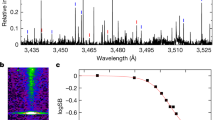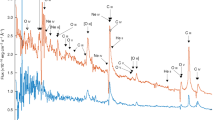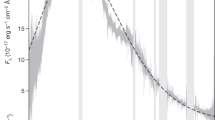Abstract
IN his letter to NATURE of Oct. 1, p. 473. Mr. I. S. Bowen has made the important suggestion that several of the chief lines in the spectra of gaseous nebulæ may be due to what spectroscopists have called ‘forbidden’ combinations of terms in the spectra of ionised nitrogen (N II), ionised oxygen (O II), and doubly-ionised oxygen (O III). It is, of course, no longer permissible to suppose the existence of hypothetical elements to account for the long-standing mysteries of nebular spectra, and we must accordingly regard the nebular lines as being produced by known elements under conditions of excitation which have not yet been imitated in the laboratory. It has seemed natural enough to look to the lighter elements, and those who, like myself, have given special attention to the spectra of these elements under widely varied conditions, have doubtless kept in view the possibility of finding some indications of nebular lines in the course of their observations. Extensive experiments, however, have failed to reveal any traces of them.
This is a preview of subscription content, access via your institution
Access options
Subscribe to this journal
Receive 51 print issues and online access
$199.00 per year
only $3.90 per issue
Buy this article
- Purchase on Springer Link
- Instant access to full article PDF
Prices may be subject to local taxes which are calculated during checkout
Similar content being viewed by others
Author information
Authors and Affiliations
Rights and permissions
About this article
Cite this article
FOWLER, A. The Origin of the Nebulium Spectrum. Nature 120, 582–583 (1927). https://doi.org/10.1038/120582a0
Issue Date:
DOI: https://doi.org/10.1038/120582a0
Comments
By submitting a comment you agree to abide by our Terms and Community Guidelines. If you find something abusive or that does not comply with our terms or guidelines please flag it as inappropriate.



